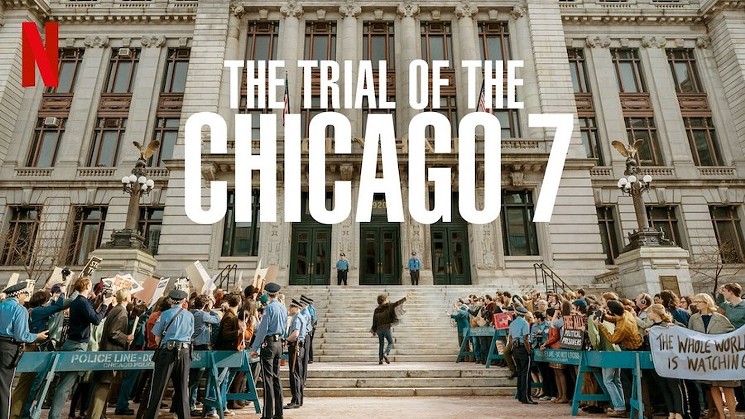by Bryan & Heather
In a pattern that has its origins in the rushed final month of American history classrooms across the country, neither of us is overly familiar with the more recent history of the United States (though we’ve both become more so out of necessity as we coach the students left behind by that hurried final month). While we can rattle off a highlight reel of the Vietnam War or speak generally of the counterculture, the Cold War is rarely the setting of our books or media of choice. As the recent Aaron Sorkin & Netflix film The Trial of the Chicago 7 gathered acclaim, however, and in light of recent events involving civil rights and their expression in and through the courtroom, we decided to make a foray into the unfamiliar. In so doing, we were introduced to a riveting, unsettling story that demonstrates exactly why this period of history should be given much more coverage in American classrooms than it so often is.
For those unfamiliar with its subject (as indeed we largely were going in), The Trial of the Chicago 7 covers the anti-Vietnam War protests and riots in Chicago during the 1968 Democratic National Convention and the subsequent trial of seven of the protests’ leaders. Though the outgoing Johnson administration declined to press any charges due to their own findings that police had instigated most of the violence, the new Nixon Justice Department prosecuted these men, plus an eighth (a black man, Bobby Seale, unconnected to the protests), for conspiracy and inciting a riot. This blatantly political trial quickly became the focus of the nation, in large part due to the clear bias and discrimination of the case’s Federal judge and the resulting antics & responses of the defendants and, ultimately, even their lawyers. In classic courtroom drama fashion, The Trial of the Chicago 7 does not proceed linearly, instead flashing back to show the events of the summer of 1968 when triggered by testimony or other reminiscence, preserving the audience’s veil of ignorance until the story requires they know what occurred. These flashbacks, as well as the film’s introduction, also splice in actual news footage from the era, including haunting black-and-white scenes of police brutality against protesters as it actually occurred.
As is always the case in such a film, Sorkin takes certain liberties with actual events, massaging timeline and re-attributing certain dialogue to better fit his narrative. The Trial of the Chicago 7 is less about details than about themes, however, and themes are present in abundance. For a film that was originally supposed to be made over a decade ago, Sorkin’s work seems perfectly timed, almost as if conceived in the summer of 2020 in the wake of the protests that rocked the nation following the death of George Floyd at the hands of police. Just over fifty years ago, Americans could also watch in the news as protesters were denied their constitutional right to protest and were assaulted by a militant police force more interested in cracking heads than de-escalating the situation. The actions of the defendants and those who oppose them, both before and during the trial, raise legitimate questions surrounding the right to protest, one of the most foundational elements of the country’s founding documents, and remind audiences that the ‘current’ interpretations of many civil liberties have not always been the case. Watching a black man be framed, denied his Constitutional right to counsel, then bound and gagged for demanding that his right to counsel be respected is a scene no American should be allowed to turn away from. Finally, through the despicable and infuriating person of the case’s presiding justice, Sorkin emphasizes the extent to which liberty and justice are decided by the personal, subjective decisions of individuals within our system, regardless of what the actual law dictates should be the case.
If you’re willing to engage with the questions and truths Sorkin’s film presents about the state of modern America, we guarantee you will emerge a more conscientious citizen then when you began. The film has a way of drawing you in, demanding your attention, and sticking with you for days afterwards. There is a moment in The Trial of the Chicago 7 when Abbie Hoffman, one of the defendants (portrayed by the indomitable Sacha Baron Cohen), is telling the story of the riots to a packed crowd in a stand-up comedy-esque monologue. As police officers take off their badges and prepare to assault a group of protestors just outside a ritzy Chicago club filled with politicos watching the convention, Hoffman wryly comments that it was “the ‘50s inside the bar; the ‘60s outside the bar.” That line has stuck with us. It seems so reminiscent of the ongoing efforts to deny and obfuscate pressing social issues in our society of 2021, and simultaneously of how little has changed in the last fifty years. It is 2021 inside the bar, and it is still the ‘60s outside the bar.
